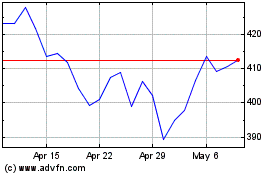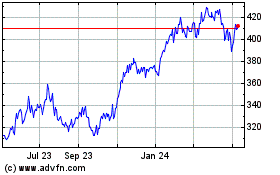Microsoft Executive Says Curbing Terrorists' Use of Internet Is 'Challenging'
May 11 2016 - 11:38PM
Dow Jones News
By Farnaz Fassihi (917 655 4300)
UNITED NATIONS -- A senior Microsoft executive said Wednesday
that technology companies face a daunting challenge in stopping
terrorists from accessing online platforms, as they need to respect
free-speech rights even as they try to eliminate hate messages.
"There is no silver bullet that will stop terrorist use of the
Internet, " Steven Crown, vice president and deputy general counsel
of Microsoft, told a United Nations Security Council special
meeting on countering terrorists' ideology. "We know that there are
tens of thousands terrorist Internet accounts that refuse to die.
As one is taken down, another quickly springs up in its place."
Mr. Crown pointed to the successful partnerships between tech
companies and governments on cracking down on child-sex-abuse
material globally as an example of how the tech industry can assist
governments in pursuing shared goals.
However, he said tech companies' policing of terrorist ideology
on online platforms was hamstrung by the fact that there is no
universal definition of what constitutes a terrorist group.
Since Islamic State emerged in Iraq and Syria, the extremist
group has put the Internet and social media at the center of its
strategy for recruiting disenchanted youth in Muslim countries and
in both Europe and the U.S. The group has promoted its message
through Twitter, YouTube, Instagram and Facebook, in multiple
languages. According to the U.N., some 30,000 people world-wide
have traveled to Syria and Iraq to join Islamic State since its
inception.
Wednesday's special meeting was held to develop an international
framework for fighting terrorism that would foster partnerships
between governments, civil society, religious institutes and tech
companies. U.N. member states approved a council statement citing
their concerns about the ability of terrorist groups to exploit
digital technologies to recruit members and misrepresent religion
to justify violence.
U.S. Ambassador Samantha Power warned member states against
using the fight against terrorism as a cover to suppress dissident
voices on the Internet and social media. Many countries such as
Egypt, Saudi Arabia and Iran routinely arrest and prosecute
journalists and activists critical of the regime, citing national
security and terrorism concerns.
"Legal action is a critical tool in the campaign against ISIL
but it must not be wielded like a cudgel against those who voice
unpopular speech or criticize authorities," Ms. Power told the
Council, using another name for the extremist group. "Such behavior
doesn't prevent violent extremism, it fuels it."
While she didn't single out any country, her comments appeared
to be aimed at Egypt, which has branded the Islamist party Muslim
Brotherhood as a terrorist group and recently handed down death
sentences in absentia to journalists working for Al Jazeera on
allegations their reporting sympathized with the group.
Egyptian Foreign Minister Sameh Shoukry, who chaired the
meeting, said afterward that Ms. Power's comments were
counterproductive and detracted from the focus that the
international community must place on terrorist groups.
"We uphold freedom of expression, we uphold freedom of
journalism," he said, speaking of the Egyptian government.
Mohi el-Din Afifi, secretary-general of Al-Azhar Islamic
Research Academy in Cairo, told the Council that the academy has
established a digital center to monitor Islamic State's online
activity. The center will also counter the extremist group's
religious edicts, known as fatwas, and refute their extreme
interpretation of Islam. It was also training clerics to denounce
extremism and preach on the importance of abiding by local
laws.
Mr. Afifi remarked that even Islamic leaders face the wrath of
extremists online. Islamic State recently called for the murder of
eleven Imams and scholars who were countering their ideological
narrative online.
"Their ideas are not based on real jurisprudence," Mr. Afifi
said. "These organizations exploit virtual world and market
terrorism."
(END) Dow Jones Newswires
May 11, 2016 23:23 ET (03:23 GMT)
Copyright (c) 2016 Dow Jones & Company, Inc.
Microsoft (NASDAQ:MSFT)
Historical Stock Chart
From Aug 2024 to Sep 2024

Microsoft (NASDAQ:MSFT)
Historical Stock Chart
From Sep 2023 to Sep 2024
